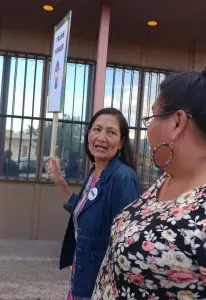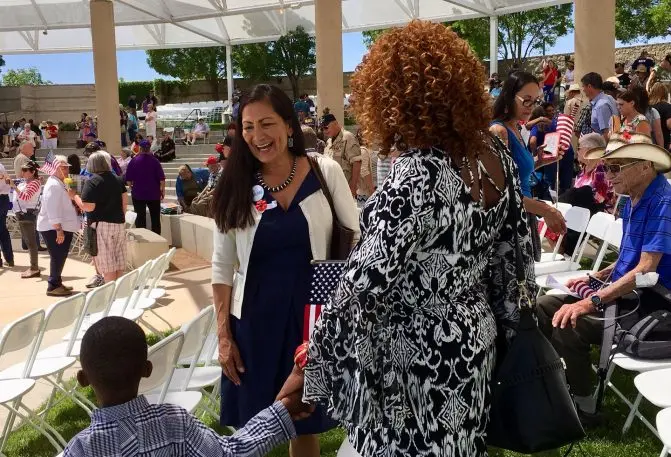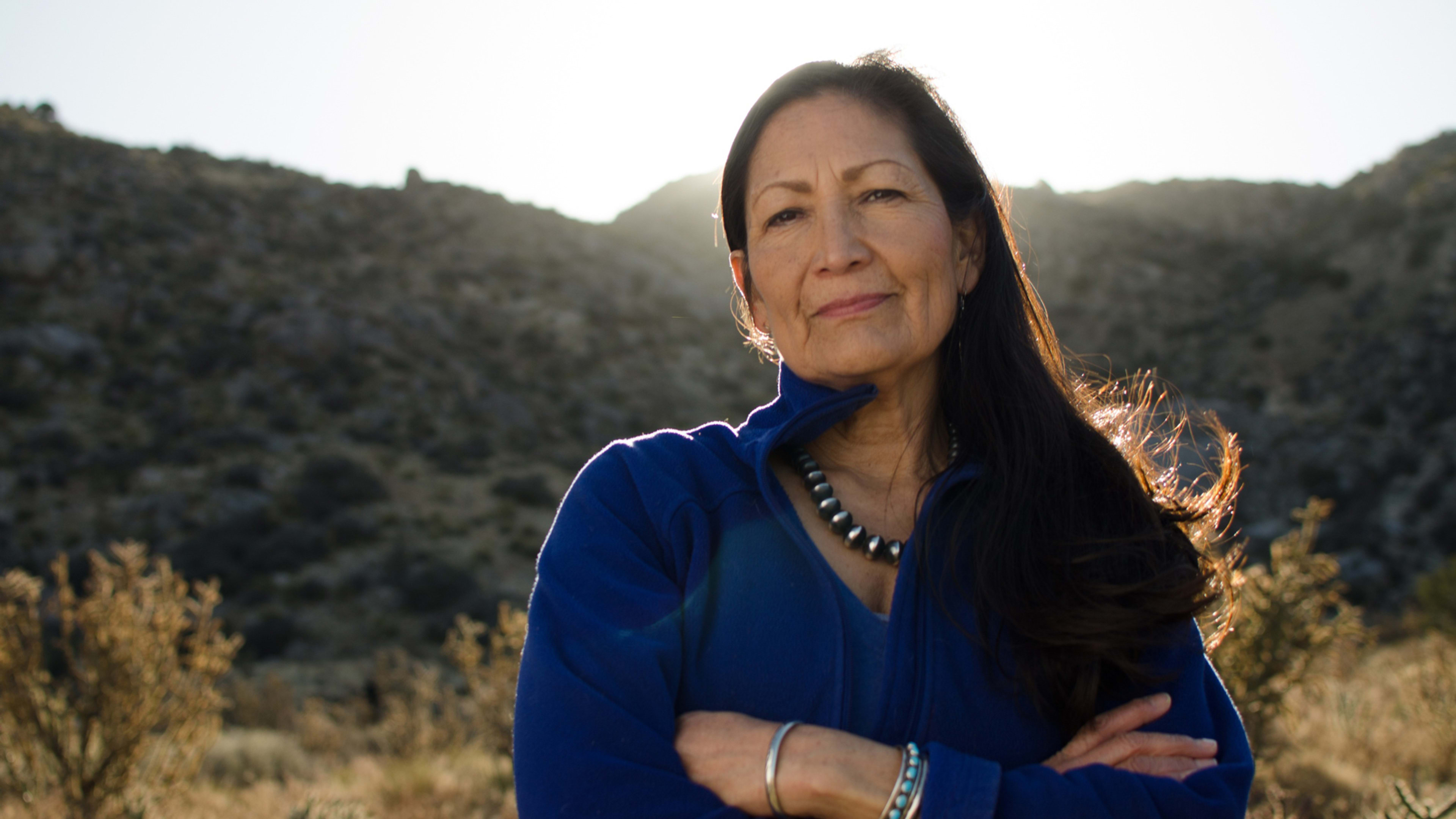“I don’t look like most people in Congress,” begins the 30-second TV ad.
It’s dusk and a woman with long, thick black hair–clad in jeans, sneakers, and Patagonia wear–is seen ascending a mountain. Against a majestic scenic backdrop, she attempts a rocky climb, all while listing her accomplishments: She finished college and law school as a single mom, is now 30 years sober, and learned how to fight for her beliefs.
“Struggle made me fierce,” she stresses while traversing the terrain, adding, “Trump won’t hand us a thing if we ask politely.”
This is Deb Haaland, 57, Democratic candidate for New Mexico’s 1st congressional district. And she doesn’t look like most people in the legislature because Haaland is Native American–a member of the small Pueblo of Laguna tribe. If she wins the election, she will become the very first Native American congresswoman in the country’s history.
The Native American population is a small one, representing less than 2% of the nation. They’ve joined the ranks of Congress, but they have been few in number. That’s slowly changing as a record number of minorities and women are running campaigns in upcoming elections.
“When I get [to Congress], I won’t seek to be a voice for my tribe or anyone’s tribe,” Haaland tells Fast Company, “but bring those voices to the table.”
Historic roots
Haaland hails from a family of service: Her Marine father boasted a 30-year career that included being awarded the Silver Star for saving comrades’ lives in Vietnam. Her mother served in the Navy, followed by 25 years as a federal employee in Indian education.
“Both of my parents, essentially, were public servants,” says Haaland.
At a young age, Haaland was made aware of sacrifice for the greater good, but also of the potential horrors that can accompany government interference. Her maternal grandmother spoke often about a particularly dark time in American history; at just 8 years old, she was taken from her family and sent to boarding school, where she remained for five years. The separation was used as a means to Westernize Native American children, and its cruelty eerily echoes what some see happening at the border present day.
Despite her traumatic childhood, Haaland’s grandmother never grew bitter or hopeless. She encouraged her grandchild to get involved and speak for her people, to work for American causes. A young Haaleman leaned on her grandmother for strength during college, and later, law school. That family connection rooted her for years to come.

More recently, she spoke out against the current administration’s plans to reduce the size of Bear Ears National Monument, a land which Native Americans hold sacred. In 2017, Haaland stood alongside indigenous activists protesting the construction of the Dakota Access pipeline at Standing Rock.
In an essay posted on Medium, Haaland wrote of her heritage’s philosophy towards protecting public lands, noting, “they help preserve ancient histories of people who came before us–people who better understood the importance of honoring our land, water, and air.” She then quotes Qwatsinas, hereditary chief of the Nuxalk Nation in British Columbia, who once said: “We must protect the forests for our children, grandchildren, and children yet to be born. We must protect the forests for those who can’t speak for themselves such as the birds, animals, fish, and trees.”
Today, Haaland speaks optimistically about Native American rights and increased representation. She sees a new political landscape–especially in her home state–that’s far more progressive and inclusive than decades past. Former Democratic governor Bill Richardson (2003 to 2011), for example, established the first Cabinet-level Indian Affairs Department and implemented a number of laws to economically aid tribes. It’s a far cry from just 70 years ago, when Native Americans were weren’t permitted to vote in New Mexico state elections.
“We have had a struggle,” she concedes.
Personal politics
While Haaland often stands as the only Native American in the room, she counts her heritage for providing her with empathy, courage, and the ability to imagine a better America. This proves extremely useful in a state in which half the population is on Medicaid, is affected most by child poverty, and a third of children go to bed hungry. “And that’s true for many Native communities across the country,” says Haaland. “It’s definitely an advantage when you are [able to] put yourself in other people’s shoes.”
Empathy stems her own personal struggles as well. She talks of the hardships of raising a child on her own, all while putting herself through school. Struggling to make ends meet on food stamps, Haaland recalls getting “pretty creative” to ensure her child was provided educational and economic opportunities. The experience also gave her a good glimpse into the importance of public services and how they mold personal and communal growth.
“I had to teach my daughter at a young age how to ride a city bus because I couldn’t always pick her up,” says Haaland, “and that’s why I feel like I understand how important public transportation is for folks who don’t necessarily have other means of transportation.”
Much of Haaland’s personal history reflects the issues her campaign most staunchly advocates. Women’s reproductive rights and support of Planned Parenthood is directly linked to when she herself depended on the now politically targeted clinics throughout her pregnancy. Haaland becomes most animated while discussing health care, an issue in which she cannot help but lay blame, stating she’s “appalled” by Republicans attacks on the Affordable Care Act, which she believes cannot be repealed until there’s a superior alternative.

Haaland also tackles climate change, specifically how to make New Mexico a renewable energy leader in the country. “We have almost 300 days of sun per year — that is one area that if we do it right, will create thousands of jobs for people across the state,” she explains.
In the last few years Haaland focused on “getting big dark money out of politics,” criticizing out-of-state SuperPACs’ influence on New Mexico politics. She publicly pledged to avoid accepting any corporate PAC money, instead relying mostly on grassroots donations. However, she was recently the beneficiary of 7Gen Leaders, a new superPAC which provides support to Native American candidates. That, she stresses, is different: “Indian tribes are most underrepresented group of folks [in America].”
Haaland won the primary in early June–with 39% of the vote–to replace Representative Michelle Lujan Grisham, who vacated her seat to run for governor. Haaland will now compete against GOP nominee Janice Arnold-Jones and Libertarian candidate Lloyd Princeton in November’s general election. New Mexico was once considered a swing state, though Barack Obama won it by 10 percentage points in 2012, and more recently, Democratic candidate Hillary Clinton by 16.5 points. The 1st congressional district mostly leans blue.
She is quick to point out her humble beginnings (“neither one of my parents graduated from college…. I’m not well-connected”) and her proud hurdles (her opponent outspent her 3 to 1 on TV ads), which are in line, as a whole, with her Native American struggle. She’s not the first Native American woman to run for Congress, but she certainly hopes she can be the first to win a seat.
“I’m here because I worked hard,” says Haaland. “I hope that when I win, I could help other Native women navigate their path and also run for office. I’m advocating for us to run in every level–school board, city council, county commission, state legislature. We need diversity at every level of government.”
Recognize your brand’s excellence by applying to this year’s Brands That Matter Awards before the early-rate deadline, May 3.
